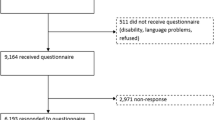Abstract
Standard scoring algorithms were recently made available for aggregating scores from the eight SF-36 subscales in two distinct, higher-order summary scores: Physical Component Summary (PCS) and Mental Component Summary (MCS). Recent studies have suggested, however, that PCS and MCS scores are not independent and may in part be measuring the same constructs. The aims of this paper were to examine and illustrate (1) relationships between SF-36 subscale and PCS/MCS scores, (2) relationships between PCS and MCS scores, and (3) their implications for interpreting research findings. Simulation analyses were conducted to illustrate the contributions of various aspects of the scoring algorithm to potential discrepancies between subscale profile and summary component scores. Using the Swedish SF-36 normative database, correlation and regression analyses were performed to estimate the relationship between the two components, as well as the relative contributions of the subscales to the components. Discrepancies between subscale profile and component scores were identified and explained. Significant correlations (r = −0.74, −0.67) were found between PCS and MCS scores at their respective upper scoring intervals, indicating that the components are not independent. Regression analyses revealed that in these ranges PCS primarily measures aspects of mental health (57% of variance) and MCS measures physical health (65% of variance). Implications of the findings were discussed. It was concluded that the current PCS/MCS scoring procedure inaccurately summarizes subscale profile scores and should therefore be revised. Until then, component scores should be interpreted with caution and only in combination with profile scores.
Similar content being viewed by others

References
Ware JE, Kosinski M, Bayliss MS, McHorney CA, Rogers WH, Raczek A. Comparison of methods for the scoring and statistical analysis of SF-36 Health Profile and Summary Measures: Summary of results from the Medical Outcomes Study. Med Care 1995; 33: AS264.
Ware JE, Kosinski M, Keller SD. SF-36 Physical and Mental Health Summary Scales — A User's Manual. Boston, MA: New England Medical Center, The Health Institute, 1994.
Hurst NP, Ruta DA, Kind P. Comparison of the MOS short form-12 (SF12) health status questionnaire with the SF36 in patients with rheumatoid arthritis. Br J Rheumatol 1998; 37: 862–869.
Simon GE, Revicki DA, Grothaus L, Von Korff M. SF-36 Summary Score — Are physical and mental health truly distinct? Med Care 1998; 36: 567–572.
Sullivan M, Karlsson J, Taft C. The Swedish SF-36 PCS and MCS — Manual and Interpretation Guide. Göteborg: Sahlgrenska University Hospital, 1997.
Sullivan M, Karlsson J. SF-36 Hälsoenkät: Svensk manual och tolkningsguide (Swedish Manual and Interpretation Guide). Göteborg, Sweden: Sahlgrenska University Hospital, 1994.
Sullivan M, Karlsson J, Taft C, Kreuter M. Interpretation of aggregated health-related quality of life scores: Examples from a clinical research program. Qual Life Res 1999; 8: 612.
Younossi ZM, Kiwi ML, Boparai N, Price LL, Guyatt G. Cholestatic liver diseases and health-related quality of life. Am J Gastroenterol 2000; 95: 497–502.
Taft C, Karlsson J, Persson L-O, Steen B, Sullivan M. Self-rated health in 70 year old men and women. Clinical relevance of profiles and summary scores of the SF-36. Qual Life Res 1997; 6: 729.
Hays RD, Alonso J, Coons SJ. Possibilities for summarizing health-related quality of life when using a profile instrument. In: Staquet MJ, Hays RD, Fayers PM. (eds), Quality of Life Assessment in Clinical Trials. Oxford: Oxford University Press, 1998, 143–153.
Author information
Authors and Affiliations
Rights and permissions
About this article
Cite this article
Taft, C., Karlsson, J. & Sullivan, M. Do SF-36 summary component scores accurately summarize subscale scores?. Qual Life Res 10, 395–404 (2001). https://doi.org/10.1023/A:1012552211996
Issue Date:
DOI: https://doi.org/10.1023/A:1012552211996



